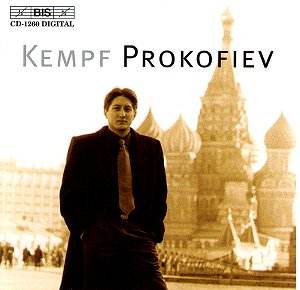Freddy Kempf, the 26-year-old British pianist
with a Japanese mother, German father, Russian wife, and Swedish
recording contract is a remarkably talented mongrel. He has recorded
five out of ten solo recitals for BIS (Schumann, Rachmaninov,
Beethoven, Chopin, and Liszt) and his latest release features
works by Prokofiev, including three short pieces by the young
composer, and two of the three so-called ‘war sonatas’ written
about thirty years later.
Prokofiev’s first sonata is seldom heard in concert.
It is essentially a string of rhetoric packaged in dense textures
similar to those found in the piano sonatas of Scriabin, Medtner,
and Rachmaninov – imagine a Chopin ballade on vodka. It
is a work which Frederic Chiu, the American pianist, describes
as being ‘agreeably musical … but lacking the piquant imagery
that peppers his other works.’ Kempf dashes through the piece
with a youthful abandon appropriate for this teenage composition,
making the most of what the composer in his later years unkindly
referred to as ‘a piece of juvenilia’. Compared to this engaging
performance (which, for me, turns out to be the highlight of this
CD) Glemser’s account on Naxos appears well-mannered and relatively
pedestrian. The fearsome technical difficulties of the following
Etude (Op.2 No.1) and Toccata are swatted aside
with apparent relish, providing an impressive and enjoyable opening
to this recital.
The sixth and seventh sonatas are two of Prokofiev’s
most frequently performed and recorded piano works. These are
accomplished performances but ones which do not adequately reflect
the words of Richter, the dedicatee of the 7th sonata,
who spoke of how these sonatas take one ‘into a world which had
lost its balance…The powers of death and destruction rage before
the eyes of people who nevertheless find that which makes life
worth living continues to survive’. Both Richter’s and Kissin’s
performances of the sixth, and Pollini’s seventh, transport us
some way towards this description. For all Kempf’s commanding
dexterity in the outer movements, the slow movements in both sonatas
show him at his best, where his thoughtful phrasing and mellow
tone allow a bleak atmosphere to develop. In other places, such
as the motoric precipitato of the seventh sonata, where
some of the accents and phrasing sound as if they have been influenced
by other musical genres, there lacks a convincing, or at least
a mature, interpretation. Perhaps this is due to slightly over-indulgent
rubatos which trip up the musical momentum, and one might also
blame the sound on this recording for being too warm to ideally
capture the percussive elements in Prokofiev’s music.
Although this CD will please Kempf’s fans and
does no harm to his reputation as one of the most promising young
British pianists, I wonder if there is any justification other
than marketing considerations which lead him to record pieces
which already saturate the catalogue. Why were the other three
Op.2 etudes not included? Apparently, he has recently recorded
the complete Chopin etudes; those looking for a taster may be
interested to know he will be playing the Op.25 at the Wigmore
Hall in mid-December.
Michael McMillan
